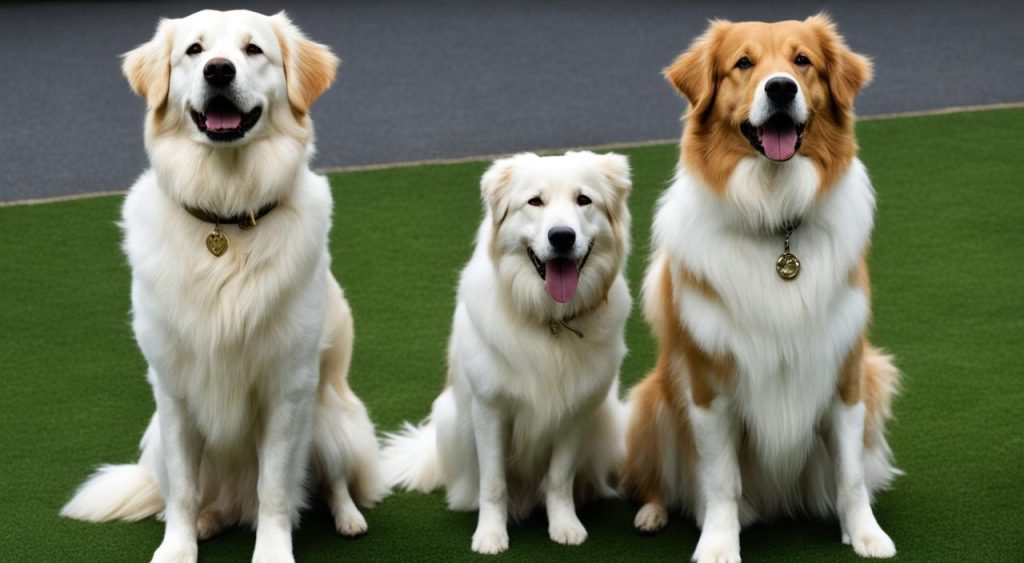Golden Retrievers are beloved family pets known for their friendly nature and intelligence. However, like any other breed, they go through different stages as they grow, each with its own challenges and difficulties. Understanding these stages can help you navigate through them successfully and ensure a harmonious bond with your Golden Retriever.
One of the most challenging ages for Golden Retrievers is the adolescent stage, which typically occurs between 6 months and 2 years of age. During this stage, your Golden Retriever will go through hormonal changes, experience increased energy levels, and have a tendency to test boundaries. This can result in behaviors like hyperactivity, destructive chewing, selective listening, and increased stubbornness.
To help your Golden Retriever navigate this challenging age, it is important to provide consistent training, exercise, and socialization. Training should focus on positive reinforcement techniques to ensure good behavior and obedience. Exercise will help burn off excess energy and keep your dog engaged. Socialization will help them become comfortable with other dogs, people, and new environments.
With patience, proper training, and understanding, the challenges of the adolescent stage can be overcome, leading to a well-behaved and obedient adult Golden Retriever. By investing the time and effort during this phase, you will lay the foundation for a lifelong, loving relationship with your furry companion.
Key Takeaways:
- The adolescent stage, between 6 months and 2 years, is often the most challenging age for Golden Retrievers.
- During this stage, dogs experience hormonal changes, increased energy levels, and a tendency to test boundaries.
- Behavioral challenges during the adolescent stage include hyperactivity, destructive chewing, selective listening, and increased stubbornness.
- Consistent training, exercise, and socialization are crucial to help your Golden Retriever navigate this age successfully.
- With patience and understanding, the challenges of the adolescent stage can be overcome, leading to a well-behaved adult Golden Retriever.
Dealing with a Golden Retriever Puppy
Golden Retriever puppies can be a bundle of energy, requiring dedicated attention and proper training. Establishing a consistent routine is key to ensure their development and well-being.
First, create a schedule that includes regular feeding times, exercise sessions, and dedicated training sessions. This structure will help your puppy understand expectations, making training more effective.
Socialization is vital during this stage. Introduce your puppy to other dogs, people, and new environments. This exposure will help them become confident and adaptable adults.
Consistency and positive reinforcement are crucial for training. Use rewards and praise to teach your puppy good manners, obedience, and basic commands. Patience and repetition will yield the best results.
Golden Retriever puppies may display behaviors such as play biting, chewing on furniture, or having excessive energy. Redirect their attention to appropriate toys and outlets for their energy. Consistency in training will help address these issues.
Addressing behavior issues early on and providing mental stimulation through puzzle toys or interactive playtime can prevent future problems and foster a well-behaved adult dog.
The Adolescent Stage: Challenges and Tips
The adolescent stage, which typically occurs between 6 months and 2 years of age, can be challenging for both you and your golden retriever. During this stage, your furry friend will experience hormonal changes, increased energy levels, and a tendency to test boundaries.
You may notice behaviors such as selective listening, increased stubbornness, destructive chewing, and hyperactivity in your teenage golden retriever. These are all normal aspects of their development during this stage. However, it is crucial to provide consistent training, exercise, and mental stimulation to help your dog navigate through this challenging period.
Obedience training is especially important during the adolescent stage to teach your golden retriever proper manners and self-control. Using positive reinforcement and consistency, you can instill good behavior habits and help your dog become a well-behaved member of your family.
“During the adolescent stage, it’s important to remember that your golden retriever is still learning and growing. Patience, understanding, and consistent guidance will go a long way in helping both of you get through this challenging stage and create a strong bond.” – Dr. Sarah Thompson, Certified Dog Trainer
In addition to training, socialization with other dogs, people, and new environments is crucial for your teenager. This will help them develop proper social skills and prevent fear or aggression issues from arising in the future.
Dealing with a teenage golden retriever requires dedication, patience, and understanding. Keep in mind that this is just a phase in their development, and with your guidance, they will mature into a well-behaved adult dog. By providing the right training, exercise, and socialization, you can help your golden retriever navigate through this challenging stage and become a loyal and obedient companion.
Conclusion
As a Golden Retriever owner, it is essential to understand the different stages your furry companion will go through and the challenges that come with each age. Among all these stages, the adolescent phase, which typically occurs between 6 months and 2 years of age, is known to be the most challenging for Golden Retrievers.
To help your Golden Retriever navigate this challenging stage successfully, consistency is key. Consistent training, exercise, and socialization will play a significant role in shaping your dog’s behavior and mindset. By providing your Golden Retriever with these essential aspects, you can help them become a well-behaved and obedient companion.
Understanding the unique energy levels and behaviors of Golden Retrievers at different ages is crucial for creating a strong bond with them. With patience, proper training techniques, and a deep understanding of your furry friend’s needs, you can overcome the challenges of each stage and enjoy a lifelong, loving relationship with your Golden Retriever.





